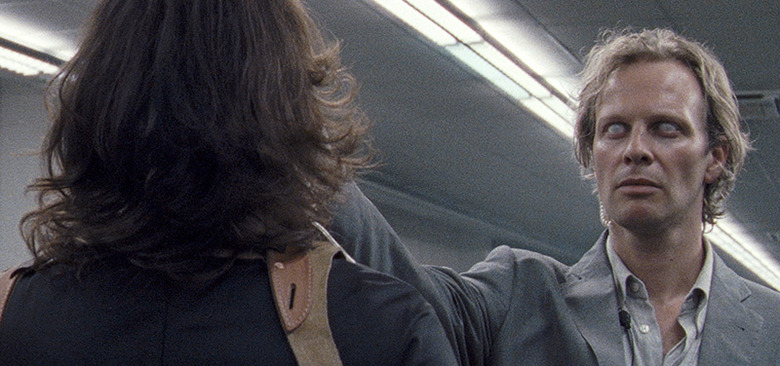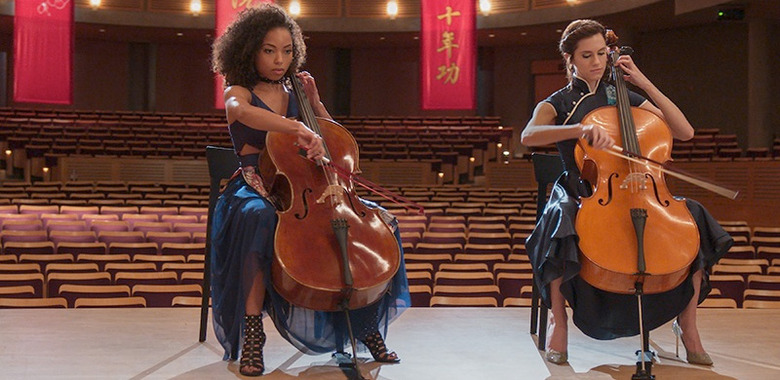Fantastic Fest Day 1: 'Halloween' Slays, 'Luz' Confounds, And 'The Perfection' Rises To Glorious Lows
(Welcome to The Fantastic Fest Diaries, where we will be chronicling every single movie we see at the United States' largest genre film festival.)
It's raining at Fantastic Fest this year. The forecast says it'll drizzle all week. And when the skies aren't opening up, the air is thick with humidity. It's typical of Austin, Texas – this city will never not make its visitors and denizens alike miserable when it comes to weather. It comes with the territory. You get used to it or you melt.
And yet, we gather in the increasingly warm lobby of the Alamo Drafthouse South Lamar. And yet we congregate under the outdoor tents, attempting to stay dry and cool. And yet, we never consider going home or calling it a day. Because we're here to see movies at one of the world's craziest film festivals, a place where major Hollywood premieres and foreign oddities are treated with equal reverence.
Welcome to Fantastic Fest. On day one: David Gordon Green's incredibly entertaining Halloween, the wild German arthouse horror import Luz, and the astonishing and deranged thriller The Perfection.
Halloween is the Second Best Movie in the Series
It's admittedly a low bar, but the new Halloween movie from director David Gordon Green is easily the second best movie in the long running horror series. As a direct sequel to John Carpenter's 1978 masterpiece, it is free to ignore the baggage of the increasingly dire sequels (not to mention Rob Zombie's rightfully-maligned remake) and take a back-to-basics approach to the tale of masked manic Michael Myers. The result is a film that is wholly satisfying – slasher movies are rarely this slick and rarely have this much personality. Green hasn't made a frightening film, but he has made one that honors what makes Carpenter's film a classic while forging its own path.
Longtime fans will appreciate the former. Green's film is littered with easter eggs and references to films from throughout the franchise, but they feel worked into the fabric of the narrative. The film never stops in its tracks to wink and instead finds a way to wink as it stalks right by you. Other reboots should take note.
But it's the "forging its own path" thing that makes Halloween such a treat. Despite their clear affection for Carpenter's work, Green and his team have not made an imitation. Even with that familiar score pounding through the speakers (Carpenter's own update on his classic theme is killer stuff and will sell a lot of soundtracks this season), Halloween is a David Gordon Green movie through and through. When Michael Myers isn't cutting throats and smashing heads, the film slows down for slice-of-life character work, gentle stoner humor, and a few supporting characters who feel like they've wandered in from one of his indie dramas. These touches are welcome and elevate Halloween above the standard slasher template – you care about the victims and the world they inhabit. It's easy to feel spoiled when the credits roll – why can't all movies about masked killers be assembled with such care?
However, the highlight of the film, and the chief subject of Green interests (certainly above scaring his audience), is the women at the center of the film. Jamie Lee Curtis is back as Laurie Strode, who has spent the 40 years since barely surviving her encounter with The Shape preparing for his return and arming herself to the teeth. Judy Greer, in a rare and welcome leading turn, plays her estranged daughter and newcomer Andi Matichak is Laurie's granddaughter and it's not a spoiler to say that three generations of women will have to come together to battle the evil that has lingered over their family like a sickness for decades. Michael Myers, a vessel or pure, empty evil, becomes the stand-in for shared trauma and watching these women confront that trauma together makes for a cathartic, crowd-pleasing experience.
And yet, for all of its visual wit (this movie's cinematography has so much fun staging the various kills in ways you do not expect) and powerful central performances, Halloween is ultimately a simple film, a slasher flick polished to a high shine, a wheel constructed with utmost care instead of one that has been reinvented. Green has delivered the goods rather than redefining the goods. The feeling at Fantastic Fest post-screening was a little, well, underwhelmed. People wanted a masterpiece. Horror fans wanted a classic. The muted reaction felt oppressive – people often speak of a "festival bubble," where audiences go ga-ga over a perfectly decent but unremarkable movie. The opposite can also be true.
Halloween is not a classic. At least not yet, although I have a feeling that time will be kind to it. But it is a damn good movie, one that sets a new standard for what we should accept from studio-produced slasher movies. That's more than enough.
Luz is a Demonic Possession Movie Unlike Anything You've Seen
Here's the ultimate backhanded compliment, but one that I'll levy with the utmost respect: I can't wait to see Tilman Singer's second film.
To call Luz a demonic possession horror movie would do it a disservice. It's too daring in its structure and too complex in its goals to be lumped with every The Exorcist knock-off out there, but it is its refreshing twist on this genre that makes it so appealing in the first place. What little narrative exists here is hard to sum up – this is a film that's interested in atmosphere and hazy memory, not so much in delivering an easy-to-digest experience. It's a puzzle movie, albeit one that only gives you half the pieces by design.
There are no spinning heads and green vomit here. There aren't even priests (although there is plenty of blasphemy). There is just a police interrogation, one that utilizes hypnosis to recreate a potential crime, one that spirals out of control because one of the participants has been taken over by something dark and unholy with malevolent intentions. Thus begins a slow descent into hell, and the rare movie about demonic possession that places the hellish entity front-and-center as a full-fledged character with motivations and desires. It's fascinating. And then confounding. Luz's lack of easy answers, its fractured narrative, is its chief appeal. This is a frustrating film (intentionally so) and mileage will vary among audiences. Are these frustrations worth obsessing over? Do you want to solve the possibly unsolvable puzzle? Luz tests your patience. It baits you. It dares you.
It's not everyone's idea of a good time at the movies, but it sure is singular.
The narrative around Luz is a romantic one, an angle that plays well at film festivals. This was Singer's student film and it's the kind of student film that is so well-made and so assured that it makes other student films look like pure amateur hour. But once you promote a student film to the big leagues, the flaws become more apparent, the seams show a little more, and that 70-minute running time starts to feel less like a choice and more like a restriction based on time, budget, and resources.
But Singer's got something and Luz, while rough around the edges and shaggy in that first feature film way, announces the arrival of a voice worth watching.
The Perfection is Some Kind of Trash Masterpiece
Depending on your frame of reference, The Perfection is either going to play like the world's most psychotic soap opera or the rare American film to truly tap into that merciless and unhinged realm that South Korean thrillers have been occupying for decades. It's like someone gave peak-of-his-powers Brian DePalma a Lifetime movie and told him to go nuts. It's a glossy Hollywood production starring recognizable TV actresses that could be mentioned in the same breath as Oldboy and I Saw the Devil in the "Can You Believe This Fucked Up Shit We're Watching?" department.
I pity whoever has to cut a trailer for this movie, because the less you know going in, the less you know about its final destination, the more the film will work its sick magic. What you should know is that Girls star Allison Williams plays a former cello prodigy who returns from a decade of isolation and reunites with her former mentor and the young woman, Dear White People's Logan Browning, who has replaced her. The relationship between these two women (and Williams and Browning are both spectacular as women with more rotten layers than a moldy onion) defines the backbone of The Perfection. Things get...dark.
About halfway through The Perfection, director Richard Shepard delivers the film's first big laugh and it all clicks. Oh, this is supposed to be funny. Here is a thriller that is melodramatic by design, a film so lurid and twisted that it has to be funny or it would collapse under the weight of its own unpleasantness. Shepard has made a wild film, but it's certainly not an uncontrolled film. It is very aware of what it is, that it is dancing on that fine line between being a riff on exploitation and being outright exploitation. It's a filthy, catty movie whose slick appearance hides its trashy heart for just long enough to lure you in. If this movie doesn't leave you giggling in shock, it'll leave you outlining a furious thinkpiece.
By the time you know what you're watching, by the time you're aware of the depths The Perfection will plunge you into, it is too late to turn back. The screenplay is like a slowly escalating series of dares, swapping genres every 20 minutes and throwing you off guard and when the credits roll after the astonishing final image, it's impossibly to reconcile it with how the movie started.
I have rarely seen a movie as nuts as The Perfection. I have rarely had my buttons pushed with such ferocity. I have never been more proud to label a movie trash, because this is a trash masterpiece and I loved every giddy, grotesque, playful second of it.



